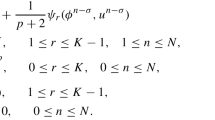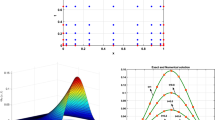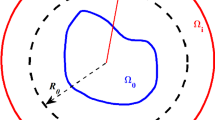Abstract
In this paper, we solve the nonlinear space fractional complex Ginzburg-Landau equations. The motivation of this work is to give a fast numerical method to solve the linear system, which is obtained from the nonlinear space fractional complex Ginzburg-Landau equations. The coefficient matrix of the linear system is the sum of a complex diagonal matrix and a real Toeplitz matrix. The significance of this work is that the new method has a superiority in computation because we can use the circulant preconditioner and the fast Fourier transform to solve the linear system. Numerical examples are tested to illustrate the advantage of the numerical method.






Similar content being viewed by others
References
He, D., & Pan, K. (2018). An unconditionally stable linearized difference scheme for the fractional Ginzburg-Landau equation. Numerical Algorithms, 79, 899–925.
Zhang, L., Zhang, Q., & Sun, H. W. (2020). Exponential Runge-Kutta method for two-dimensional nonlinear fractional complex Ginzburg-Landau equations. Journal of Scientific Computing, 83, 59. https://doi.org/10.1007/s10915-020-01240-x
Zhang, Q., Lin, X., Pan, K., & Ren, Y. (2020). Linearized ADI schemes for two-dimensional space-fractional nonlinear Ginzburg-Landau equation. Computers & Mathematics with Applications, 80, 1201–1220.
Zhang, Q., Zhang, L., & Sun, H. W. (2021). A three-level finite difference method with preconditioning technique for two-dimensional nonlinear fractional complex Ginzburg-Landau equations. Journal of Computational and Applied Mathematics, 389, 113355.
Zhang, M., Zhang, G. F., & Liao, L. D. (2019). Fast iterative solvers and simulation for the space fractional Ginzburg-Landau equations. Computers & Mathematics with Applications, 78, 1793–1800.
Milovanov, A., & Rasmussen, J. (2005). Fractional generalization of the Ginzburg-Landau equation: An unconventional approach to critical phenomena in complex media. Physics Letters A, 337, 75–80.
Mvogo, A., Tambue, A., Ben-Bolie, G., & Kofane, T. (2016). Localized numerical impulse solutions in diffuse neural networks modeled by the complex fractional Ginzburg-Landau equation. Communications in Nonlinear Science and Numerical Simulation, 39, 396–410.
Tarasov, V., & Zaslavsky, G. (2005). Fractional Ginzburg-Landau equation for fractal media. Physica A, 354, 249–261.
Tarasov, V., & Zaslavsky, G. (2006). Fractional dynamics of coupled oscillators with long-range interaction. Chaos, 16, 023110.
Guo, B.-L., & Huo, Z.-H. (2012). Well-posedness for the nonlinear fractional Schrödinger equation and inviscid limit behavior of solution for the fractional Ginzburg-Landau equation. Fractional Calculus and Applied Analysis, 16(1), 226–242.
Pu, X., & Guo, B. (2013). Well-posedness and dynamics for the fractional Ginzburg-Landau equation. Applicable Analysis, 92, 318–334.
Tarasov, V. (2006). Psi-series solution of fractional Ginzburg-Landau equation. Journal of Physics A: Mathematical and General, 39, 8395–8407.
Wang, P., & Huang, C. (2016). An implicit midpoint difference scheme for the fractional Ginzburg-Landau equation. Journal of Computational Physics, 312, 31–49.
Wang, P., & Huang, C. (2018). An efficient fourth-order in space difference scheme for the nonlinear fractional Ginzburg-Landau equation. BIT, 58, 783–805.
Huo, L., Jiang, D., Qi, S. et al. (2021). An AI-based adaptive cognitive modeling and measurement method of network traffic for EIS. Mobile Networks and Applications, 26, 575–585.
Jiang, D., Wang, W., Shi, L., et al. (2018). A compressive sensing-based approach to end-to-end network traffic reconstruction. IEEE Transactions on Network Science and Engineering, 5(3), 1–12.
Jiang, D., Huo, L., & Li, Y. (2018). Fine-granularity inference and estimations to network traffic for SDN. Plos One, 13(5), 1–23.
Qi, S., Jiang, D. & Huo, L. (2021). A prediction approach to end-to-end traffic in space information networks. Mobile Networks and Applications, 26, 726–735.
Wang, Y., Jiang, D., Huo, L. et al. (2021). A new traffic prediction algorithm to software defined networking. Mobile Networks and Applications, 26, 716–725.
Markakis, M. G., Modiano, E., & Tsitsiklis, J. N. (2018). Delay analysis of the max-weight policy under heavy-tailed tracffic via fluid approximations. Mathematics of Operations Research, 43, 460–493.
Çelik, C., & Duman, M. (2012). Crank-Nicolson method for the fractional diffusion equation with the Riesz fractional derivative. Journal of Computational Physics, 231, 1743–1750.
Saad, Y. (2003). Iterative Methods for Sparse Linear Systems. Philadelphia: SIAM.
Chan, R., & Jin, X. (2007). An Introduction to Iterative Toeplitz Solvers. Philadelphia: SIAM.
Hansen, P. C., Nagy, J. G., & O’Leary, D. P. (2006). Deblurring Images: Matrices, Spectra, and Filtering. Philadelphia: SIAM.
Author information
Authors and Affiliations
Corresponding author
Additional information
Publisher's Note
Springer Nature remains neutral with regard to jurisdictional claims in published maps and institutional affiliations.
Supported by Training Program from Xuzhou University of Technology (Grant Number XKY2019104).
Rights and permissions
About this article
Cite this article
Zhang, L., Chen, L. & Song, X. Fast iteration method for nonlinear fractional complex Ginzburg-Landau equations. Wireless Netw (2021). https://doi.org/10.1007/s11276-021-02669-0
Accepted:
Published:
DOI: https://doi.org/10.1007/s11276-021-02669-0




